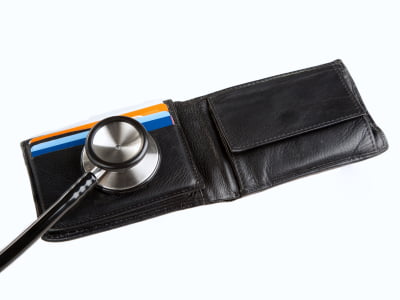Q: Can I Be Held Responsible for Medical Bills My Ex-Spouse Generated? She Was Covered on My Insurance Plan. We Just Signed Divorce Papers.
A: With medical collection activity on the rise, it is definitely possible that a hospital, clinic or healthcare provider could come after you to pay off healthcare bills incurred by your former spouse. In fact, in many states, healthcare providers use common law doctrines to force spouses of patients to pay outstanding medical debts.
Even if you don’t live in a common law state, many states consider a wife or husband responsible for a spouse’s medical bills, provided the two were living together when the medical bills were generated. That’s the case in New Jersey, where I live. Here, the Supreme Court has ruled that both spouses are liable for the “necessary” expenses incurred by the other while living together; and medical services are considered “necessaries.”
Fortunately, there are some efforts underway to safeguard spouses (and ex-spouses) when a wife or husband has racked up big medical bills. For example, many consumer protection agencies advocate exempting spouses from medical debts altogether.
What Your Former Spouse Should Do
Meantime, to protect yourself, talk to your former wife (if that’s possible) and encourage her to set up a repayment plan for her medical debt. Suggest that she review her medical bills closely to make sure she wasn’t overcharged or double-billed for anything. And share with her the resources listed below. Ultimately, of course, what your ex-spouse does or does not do is out of your control. But here’s what you can control.
How to Protect Yourself
First off, keep close tabs on your own credit files. Signing up for a good credit monitoring service is a way to do this. (I use credit monitoring from FreeCreditReport.com and myFICO.com). Unpaid medical bills don’t usually appear in your credit reports. But if they go into collections, then those accounts will be listed in your Equifax, Experian and TransUnion credit files. So be especially watchful for any collection accounts that may pop up in the future that you might have to dispute. The Federal Reserve reports that more than 50% of collection records and 20% of lawsuits that appear on credit reports are due to medical debts.
Aside from monitoring your credit, you should contact your health insurance company to inquire about any medical invoices that they didn’t pay. Perhaps there was an oversight, a missing claims form, or simply some information that you can supply that would cause the insurer to cover some of the outstanding healthcare bills.
Know the Worst-Case Scenario
Also, examine any of her healthcare bills you may have copies of – to see if there were clauses or fine print that obligated you or her (or both of you) to pay whatever was not covered by insurance. Sometimes, healthcare providers will spell out what recourse they may pursue in the event of non-payment. Aside from damaging your credit will collections, judgments or lawsuits, healthcare providers may try to garnish wages, seize assets or put a lien against your home. These are extreme tactics, and will certainly not be used in every case. But you need to be aware of all possibilities. In the end, how aggressively a healthcare provider pursues a debt will largely depend on the laws in your state, the amount of debt owed, and the extent to which the provider thinks they can shake money out your or your ex spouse.
Resources for More Help
Lastly, if you do get socked with your former spouse’s medical bills in the future, reach out to a variety of consumer organizations that can help you with this issue. Some groups that have fought wrongful medical billing practices include:
Access Project http://www.accessproject.org
Bill Advocates http://www.billadvocates.com
Consumers Union http://www.consumersunion.org
Hospital Debt Justice http://www.hospitaldebtjustice.org
National Consumer Law Center http://www.consumerlaw.org
Frequently Asked Questions
Q: Can a hospital or doctor come after me for my ex-spouse’s medical bills even though we are divorced?
A: Yes, in many states a spouse can be held responsible for the medical debts of their husband or wife, even after a divorce. Healthcare providers may use common law doctrines to force an ex-spouse to pay outstanding medical bills incurred during the marriage.
Q: What can my ex-spouse do to protect me from being responsible for their medical debts?
A: Your ex-spouse should try to set up a repayment plan to pay off the medical bills themselves. They should also closely review the bills for any overcharges or errors. Encourage them to use consumer resources to challenge any wrongful medical billing practices.
Q: How can I protect myself from my ex-spouse’s medical debts?
A: Monitor your credit reports for any collections accounts related to your ex’s medical bills. Contact your health insurer about any unpaid medical bills you may be responsible for. Review your ex’s medical bills to see if you agreed to be responsible for uncovered costs. Know your state’s laws regarding “who is responsible for medical bills in a divorce”.
Q: What are some ways a healthcare provider may try to collect my ex’s unpaid medical bills from me?
A: They may report the debt to credit bureaus, negatively impacting your credit. They could pursue wage garnishment, put a lien on your assets, or file a lawsuit against you. How aggressively they collect depends on state laws, the amount owed, and how easily they think you can pay.
Q: What can I do if I get stuck paying my ex-spouse’s medical debts?
A: Reach out to consumer advocacy groups like the Access Project, Consumers Union, and the National Consumer Law Center. They can provide guidance on wrongful medical billing practices and debt collection harassment.








